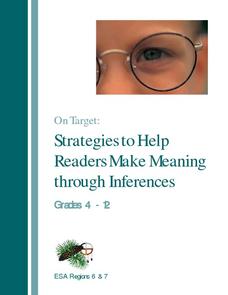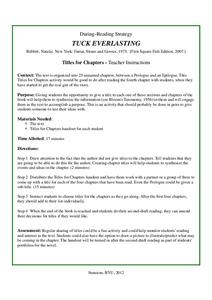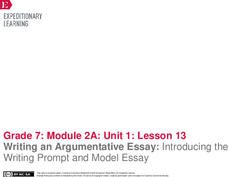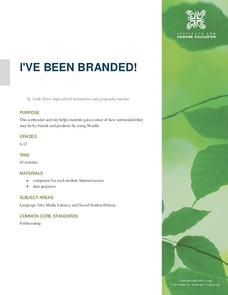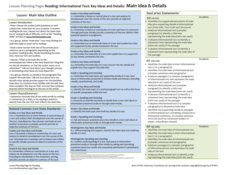Curated OER
On Target: Strategies to Help Readers Make Meaning through Inferences
Here's a resource that explicitly teaches, models, and provides readers with opportunities to practice the process of drawing inferences from text. Packed with strategies elementary, middle, and high school teachers can use, the resource...
Forum
A Research Toolkit of 12 Reading Strategies for the Foreign Language Classroom
Learning to read is not a simple task, but there are methods for assisting pupils as they develop literacy skills. The first four pages of this resource include information about language development and reading development, as well as...
Curated OER
The Outsiders: Question Answer Relationships Strategy
Kids learn best when asking questions about what they have read. Encourage active reading with a comprehension activity based on S.E. Hinton's The Outsiders, in which kids read passages from the beginning of the book and identify...
Curated OER
Walk Two Moons: Question Answer Relationship Strategy
Middle schoolers develop a strategy as they read excerpts from Walk Two Moons. Using question and answer relationship strategies class members bolster their reading comprehension as they appropriately identify and create questions.
National Center for Families Learning
The Summer Fun Summer Learning Poetry Unit
Focus on poetry this summer to enhance those comprehension, fluency, and language skills with a set of resources intended to explore different types of poetry, specifically lyric poetry. The daily activities contain differentiation ideas...
C3 Teachers
Uncle Tom’s Cabin: Can Words Lead to War?
"Words, words, words." Despite Hamlet's opinion, words can be significant. In this inquiry lesson, middle schoolers learn how the words in Harriet Beecher Stowe's Uncle Tom's Cabin, in the view of many, lead to the American Civil War. To...
EngageNY
Close Reading to Learn about Lyddie’s Character
Scholars work in pairs to analyze the characters, plot, and setting of Katherine Paterson's novel, Lyddie. Next, they apply what they learned about the characters' feelings and motivation to perform a mini reader's theater.
Novelinks
Tuck Everlasting: Similes, Metaphors, and Personification in Imagery
Poetic language is abundant in Natalie Babbitt's beautiful novel, Tuck Everlasting. Learners note the examples of similes, metaphors, and personification they find as they read, and illustrate how the language creates a sensory...
MENSA Education & Research Foundation
I Need a Superhero
Once the class learns about the hero's journey, they'll find it in every story and movie they see! Take characters from their humble beginnings to their atonement and apotheosis with a set of lessons about the hero's journey focusing...
EngageNY
Building Background Knowledge: The Dinka and Nuer Tribes
Building on a previous lesson plan, readers continue using context clues to learn new vocabulary. Additionally, they continue working on their Gathering Evidence graphic organizers, making connections between an informational text and A...
Hyperion Publishing
Words We Live By: Your Annotated Guide to the Constitution
The language of the Constitution can feel quite ominous to young learners, but there are a variety of strategies you can utilize to help your class grasp the important concepts and ideals in our nation's founding document. This lesson...
Digital Education Resource Archive
Narrative Writing Unit
Each one of the learners in your class has a story to tell, so help them learn the most efficient and organized way to tell their tale. A thorough unit on narrative writing addresses the writing process, grammar, story structure,...
Novelinks
Tuck Everlasting: Titles for Chapters
High schoolers synthesize the information they've learned from each chapter of Natalie Babbitt's Tuck Everlasting with a creative summarizing activity. With a graphic organizer for all of the book's chapters, readers title the chapter...
University of Kansas
Newspaper in the Classroom
Newspapers aren't only for reading—they're for learning skills, too! A journalism unit provides three lessons each for primary, intermediate, and secondary grades. Lessons include objectives, materials, vocabulary, and procedure, and...
K20 LEARN
If You Give a Mouse a Cookie: Conditional Statements
If, then, Else is not only a basic programming language command, it is also the basis for conditional statements used in writing. Middle schoolers try to craft conditional statements with a card sort activity and then collaborate on a...
EngageNY
Writing an Argumentative Essay: Introducing the Writing Prompt and Model Essay
Pupils begin the writing process in preparation for an end-of-unit essay based on Katherine Paterson's Lyddie. To get started, they read and discuss a model essay and learn about the similarities and differences between argumentative and...
EngageNY
Writing an Argumentative Essay: Planning the Essay
A self-assessment helps scholars take ownership of their learning. Using the resource, pupils begin a Writing Improvement Tracker to develop awareness of their writing strengths and challenges. Next, they complete worksheets to plan...
EngageNY
Gathering Information about Water Management: Assessing and Reading Internet Sources, Day 1
It takes time to discover what makes a source accurate and credible. Using everything they've learned about source credibility, scholars begin researching supporting questions about how industry and agriculture manage water. They select...
New York City Department of Education
Colonial America and The American Revolution
How did the founding of the American colonies lead to a revolution? Use the essential question and sample activities to guide learners through a series of history lessons. Additionally, the packet includes effective strategies to...
Student Achievement Partners
Eleven
Turning 11 comes with a range of emotions. Explore those emotions by reading the short story "Eleven" by Sandra Cisneros. Readers analyze the main character's reactions to the events of her day. Then, they write an essay describing what...
Institute for Humane Education
I've Been Branded!
How many pairs of Nikes® or Apple® products are in the average American home? What makes someone buy one particular type of laundry detergent over another? Scholars grapple with these questions as they develop a list of brands they use...
Novelinks
Tuck Everlasting: Bio-Poem
Learn about the characters of Natalie Babbitt's Tuck Everlasting with a character biopoem. Readers fill in a poem format to detail the character traits of Winnie, Jesse, Miles, and Mae, and share their finished poems with their peers.
Visa
Consumer Awareness
Help your pupils become wise consumers and avoid becoming targets for consumer scams and fraud. Here you'll find a PowerPoint presentation, instructional guidelines, worksheets, and suggested activities for developing shopper strategies...
For the Teachers
Main Idea Outline
Find the main idea in an informational text with a versatile lesson. Three levels of differentiation help you implement the strategy in any age or class level, based on the ability and objectives of your learners.


